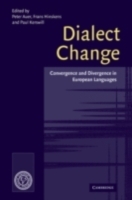Dialects are constantly changing, and due to increased mobility in more recent years, European dialects have 'levelled', making it difficult to distinguish a native of Reading from a native of London, or a native of Bonn from a native of Cologne. This comprehensive study brings together a team of leading scholars to explore all aspects of recent dialect change, in particular dialect convergence and divergence. Drawing on examples from a wide range of European countries - as well as areas where European languages have been transplanted - they examine a range of issues relating to dialect contact and isolation, and show how sociolinguistic conditions differ hugely between and within European countries. Each specially commissioned chapter is based on original research, giving an overview of work on that particular area and presenting case studies to illustrate the issues discussed. Dialect Change will be welcomed by all those interested in sociolinguistics, dialectology, the relevance of language variation to formal linguistic theories, and European languages.

